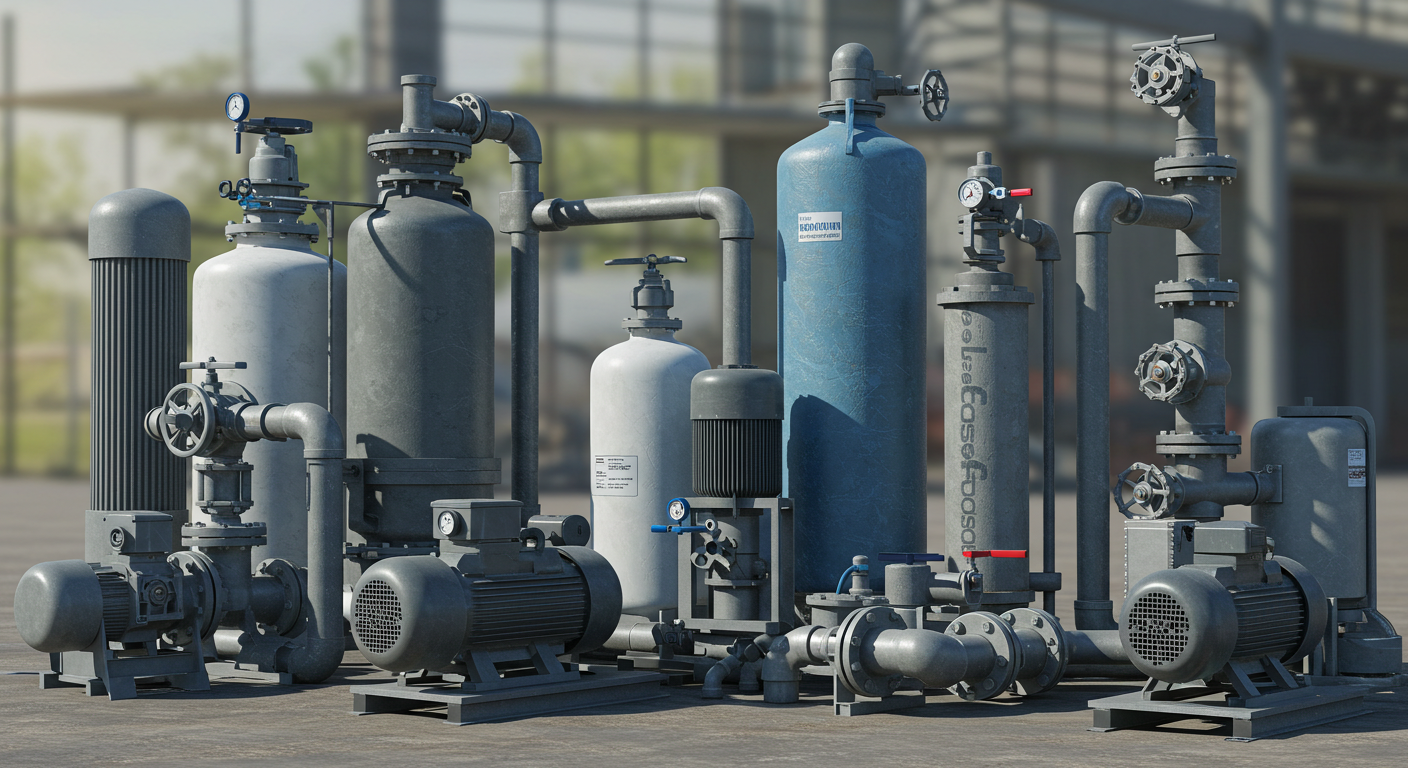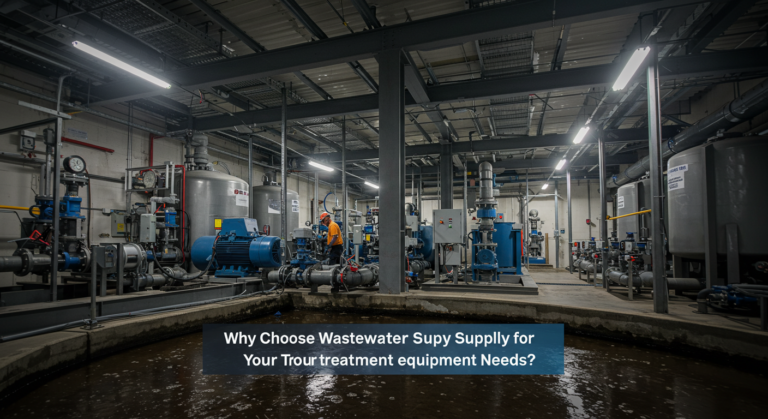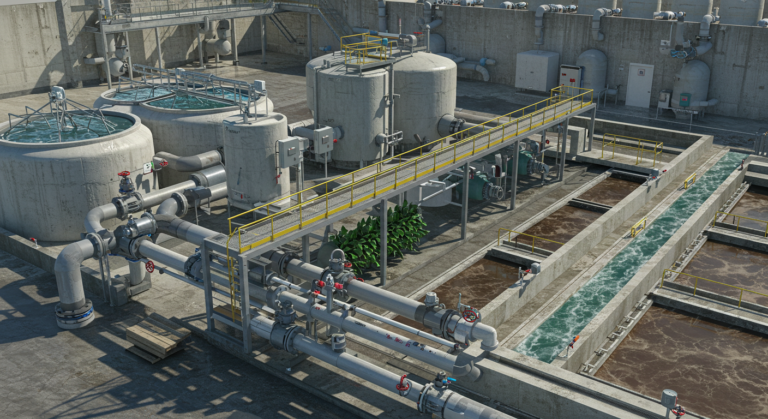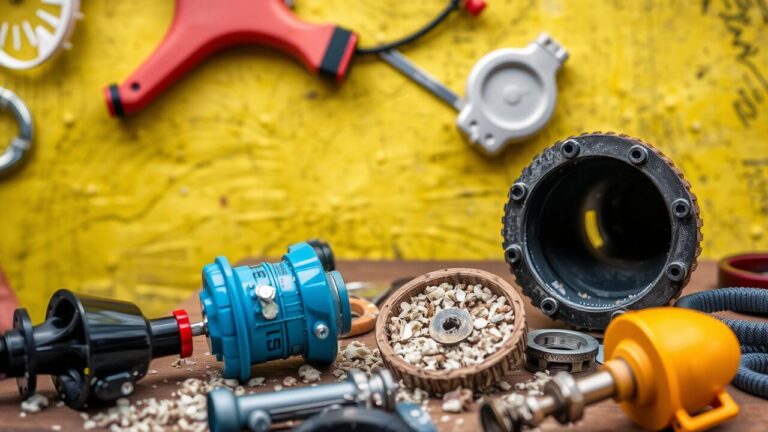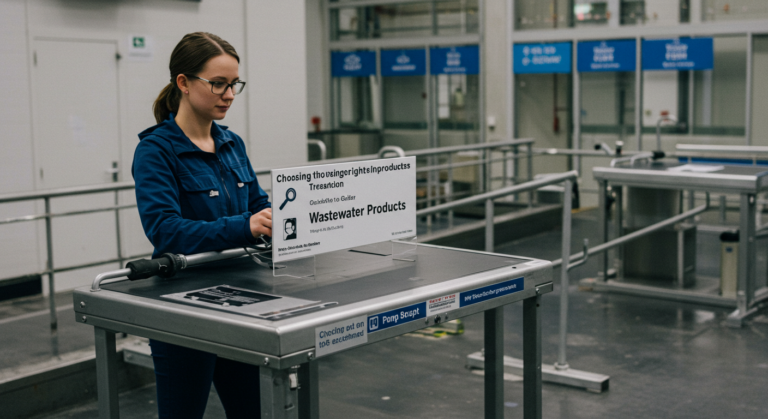Essential Waste Water Products for Efficient Treatment
Efficient treatment of wastewater is crucial for maintaining environmental health and public safety. Essential Waste Water Products for Efficient Treatment play a pivotal role in the waste treatment process, aiding in the effective disposal of hazardous waste and reducing the volume of solid waste. These products are designed to enhance the water and wastewater treatment processes, ensuring that all wastes are properly managed. By utilizing advanced solutions in treating wastewater, facilities can minimize their ecological footprint while complying with regulatory standards. Understanding the various waste products and the technology available for their management allows for improved strategies in waste disposal and enhances overall treatment efficiency.
Essential Waste Water Products for Efficient Treatment | Importance of Efficient Treatment
Efficient treatment of wastewater is crucial for the sustainability of both the environment and public health. Essential Waste Water Products for Efficient Treatment play a significant role in this process by ensuring that wastewater treatment plants operate at optimal levels. These products contribute to the effective removal of pollutants, leading to high-quality treated water that meets regulatory standards. Wastewater treatment systems, designed to address various types of wastewater, deploy essential components that help mitigate the adverse effects of untreated wastewater on ecosystems.
The importance of efficient treatment extends beyond compliance; it impacts the overall effectiveness of wastewater treatment facilities. By utilizing advanced technologies and essential products, these facilities can treat industrial wastewater effectively, ensuring that the treated wastewater is safe for reuse or discharge. Investing in the right wastewater treatment system maximizes resource utilization while minimizing environmental impact, ultimately leading to sustainable water management practices that benefit communities and ecosystems alike.
- Improve water quality by effectively removing contaminants.
- Decrease the risk of waterborne diseases and protect public health.
- Enhance system efficiency and reduce operational costs for treatment plants.
- Promote the recycling and reuse of treated wastewater for various applications.
- Support environmental conservation by reducing pollution in natural water bodies.
- Ensure compliance with regulations and standards set for wastewater discharge.
- Foster community trust and support through responsible water management practices.
Key Components of Waste Water Management
Effective waste water management relies on understanding the key components that contribute to the treatment process. Essential Waste Water Products for Efficient Treatment play a crucial role in managing both human waste and industrial wastewater treatment. Systems must be in place to handle untreated wastewater, ensuring that it undergoes primary, secondary, and tertiary treatment stages. Biological wastewater treatment methods are essential for breaking down organic matter, ultimately leading to the production of clean water and the potential for water recycling through the use of recycled water for non-potable applications.
Proper infrastructure is vital for the proper functioning of waste water management systems. Each component must address specific aspects of treatment, such as the handling of industrial water treatment and the integration of secondary wastewater treatment processes. The goal remains to reduce waste and enhance the efficiency of water resources. Emphasizing the importance of Essential Waste Water Products for Efficient Treatment enables facilities to optimize their operations, generate cleaner output, and promote sustainable practices in water management.
Types of Essential Waste Water Products
Effective wastewater management relies on a variety of essential waste water products for efficient treatment. These products play crucial roles in the primary, secondary, and tertiary wastewater treatment processes. Water treatment plants utilize these solutions to manage organic waste and treat wastewater effluent, ensuring that the treated water meets the standards required for clean drinking water. Municipal wastewater treatment facilities employ advanced technologies to separate waste oil and other contaminants from the water, enhancing the overall effectiveness of the treatment process. By incorporating these essential products, water treatment plants can significantly improve their operations and promote sustainable practices in wastewater management.
Primary Treatment Solutions
Primary treatment plays a crucial role in the management of industrial wastes and the overall process of cleaning water. Essential Waste Water Products for Efficient Treatment focus on removing large solids and contaminants from wastewaters before they undergo more advanced treatment stages. This initial step is vital for reducing the volume of solid waste, which can then be further processed into treated sewage. By effectively managing waste generation at this level, facilities can significantly improve the quality of the water supplies they are responsible for treating.
Effective primary treatment ensures that cleaned water can meet the necessary standards for subsequent processing. By utilizing the right equipment and techniques, facilities can streamline their operations, ultimately producing cleaner water that is suitable for various applications, including potential conversion into drinkable water. The integration of essential waste water products in this stage enhances the overall efficiency of treatment processes and contributes to the sustainability of water management systems.
Secondary Treatment Technologies
Secondary treatment plays a crucial role in the wastewater management process. It aims to remove certain waste products that remain after primary treatment, focusing on the biological degradation of organic matter. This level of treatment utilizes various wastewater treatment solutions, enhancing the quality of the liquid waste before it undergoes further processing. Essential waste water products for efficient treatment in this category include activated sludge systems, trickling filters, and sequencing batch reactors, all integral components of modern waste treatment systems.
The effectiveness of secondary treatment technologies lies in their ability to convert untreated waste into more manageable substances. Advanced waste treatment processes, such as membrane bioreactors and biofilm reactors, contribute to more efficient removal of contaminants. These essential wastewater treatment products not only provide effective results but can also be cost-effective options for many facilities. The selection of the appropriate secondary treatment technology is vital for ensuring long-term sustainability and compliance with environmental standards.
Tertiary Treatment Options
Tertiary treatment options play a critical role in enhancing the quality of treated wastewater, addressing various waste constituents that may remain after primary and secondary treatment stages. These advanced treatment methods utilize cutting-edge wastewater treatment technologies designed to remove residual contaminants, thereby ensuring optimum wastewater treatment. Essential Waste Water Products for Efficient Treatment include advanced filtration systems, reverse osmosis, and UV disinfection, which effectively purify water and make it suitable for reuse or discharge into the environment.
Selecting the most appropriate tertiary treatment technology is essential for achieving reliable waste disposal and maximizing the efficiency of water treatment processes. The integration of different wastewater treatment methods, such as biological treatments combined with chemical agents and filtration techniques, ensures the comprehensive removal of pollutants. Employing these water treatment technologies not only improves the quality of treated effluent but also supports sustainable practices in bulk wastewater treatment, aligning with regulations and environmental standards.
Innovative Wastewater Treatment Resources
The evolution of water treatment technology has introduced essential wastewater products for efficient treatment, enhancing the overall wastewater treatment process. Advanced filtration systems play a critical role in improving wastewater treatment performance by effectively removing waste effluents and reducing waste concentration. Biological treatment methods leverage natural processes to break down organic materials, making them a popular choice for various wastewater treatment applications. Chemical treatment agents provide a means to address specific contaminants, ensuring treated water meets regulatory standards. These innovative resources allow facilities to optimize their own wastewater treatment systems while often outperforming traditional wastewater treatment methods, ultimately leading to more sustainable practices and better environmental outcomes.
| Resource Type | Technology | Key Benefits |
|---|---|---|
| Advanced Filtration | Membrane Filtration | High efficiency in contaminant removal, reduced sludge production |
| Biological Treatment | Activated Sludge Process | Effective organic matter decomposition, lower operational costs |
| Chemical Treatment | Coagulation/Flocculation | Targets specific contaminants, enhances clarity and stability of treated water |
| Emerging Technologies | Constructed Wetlands | Natural and sustainable treatment, supports biodiversity |
Advanced Filtration Systems
Effective wastewater management requires the implementation of advanced filtration systems as part of the Essential Waste Water Products for Efficient Treatment. These systems play a vital role in separating residuals—solid waste products—from waste streams, ensuring that non-hazardous waste is properly managed before reaching water treatment facilities. By utilizing innovative water treatment techniques, these filtration systems enhance the quality of treated wastewater effluent, making it suitable for various reuse applications.
Water treatment systems equipped with advanced filtration capabilities significantly improve the efficiency of sewage water treatment. By effectively managing waste flow, these systems reduce the environmental impact associated with untreated wastewater. They form an integral part of modern water treatment facilities focused on sustainable practices. The selection of these Essential Waste Water Products for Efficient Treatment is crucial for fulfilling regulatory requirements while promoting cleaner water resources.
Biological Treatment Methods
Biological treatment methods play a crucial role in sustainable wastewater management. They utilize microorganisms to break down primary waste constituents, converting harmful substances into more manageable compounds. Techniques such as aerobic wastewater treatment are commonly employed to further purify wastewater before final disposal. These processes are essential for creating usable water, which can either be returned to the environment or repurposed for various applications. Essential Waste Water Products for Efficient Treatment are integral to optimizing these biological systems.
On-site wastewater treatment often incorporates biological methods that can effectively reduce contaminants directly at their source. Distributed wastewater treatment systems enhance this approach by allowing localized treatment solutions, minimizing transportation costs, and promoting clean water initiatives. A comprehensive guide to wastewater treatment highlights the importance of selecting the right biological products and technologies, ensuring communities can maintain a balance between effective treatment and environmental sustainability.
Chemical Treatment Agents
Chemical agents play a crucial role in municipal wastewater treatment by effectively breaking down contaminants and refining water quality. These products target debris waste and enhance the overall wastewater composition, ensuring that treated water meets safety standards. The incorporation of chemical treatment into wastewater basics not only streamlines the disinfection process but also aids in the ethical wastewater treatment necessary to preserve water resources for future generations.
A diverse range of chemical treatment agents exists, each designed to tackle specific challenges within wastewater management. From oxidizing agents for disinfection to coagulants that enhance solid removal, selecting the right chemical is paramount. Understanding the wastewater technology fact that different treatment methods yield varying results is vital for achieving effective outcomes. By utilizing Essential Waste Water Products for Efficient Treatment, facilities can optimize their processes and maintain compliance with regulatory requirements.
Selecting the Right Products for Treatment
Choosing the appropriate Essential Waste Water Products for Efficient Treatment is crucial to effectively manage dangerous wastewater and enhance cleaning water processes. Understanding wastewater characteristics allows operators to select treatments that facilitate additional water removal and maximize water reuse. For instance, employing wastewater treatment bacteria can improve the efficiency of sludge wastewater treatment, while technologies designed for oil waste management can address specific contaminants. Integrating these products within wastewater systems contributes to critical water efficiency and supports sustainable practices in water management.
Assessing Treatment Needs
Understanding the specific requirements of a wastewater treatment system is crucial for selecting Essential Waste Water Products for Efficient Treatment. Each facility may deal with various water supplies, ranging from raw wastewater to process wastewater. Careful assessment of waste feedstocks and the characteristics of everyday wastewater helps determine the most suitable technologies and equipment. This ensures compliance with regulations and enhances the treatability of drinking water derived from treated sewage effluents.
Effective municipal water treatment and home water treatment rely on a clear evaluation of treatment needs. Identifying the volume and composition of waste streams guides the selection of appropriate solutions. Emphasizing sustainable water management practices can lead to innovations in managing treated sewage and wastewater. By prioritizing these assessments, facilities can implement Essential Waste Water Products for Efficient Treatment that not only improve efficiency but also support environmental goals.
Cost-Effectiveness and Efficiency
Evaluating cost-effectiveness in wastewater management begins with a thorough assessment of Essential Waste Water Products for Efficient Treatment. Facilities handling diverse wastewater streams, including paper wastewater and pharmaceutical manufacturing waste, must implement common wastewater pretreatment solutions. Effective treatment processes reduce waste sludge generation and optimize the efficiency of wastewater filtration systems, ultimately lowering operational costs. Water-efficient technologies can also provide substantial savings in energy and resources, making them an essential consideration for wastewater facilities.
Efficiency in treatment is not solely about upfront costs. The long-term impact of using Essential Waste Water Products for Efficient Treatment can lead to significant reductions in operational expenditures. By investing in alternative water sources and advanced management practices, facilities can minimize adverse effects on the environment while improving treatment outcomes. It is crucial to analyze the financial benefits of choosing efficient technologies that align with sustainability goals and regulatory requirements, ensuring a holistic approach to wastewater management.
Environmental Impact Considerations
The environmental impact of wastewater treatment is a critical consideration in the wastewater management industry. The implementation of Essential Waste Water Products for Efficient Treatment plays a significant role in mitigating the adverse effects of hot wastewater and residual drug waste on ecosystems. Effective solutions such as trickling filters, which pass the wastewater over a bed of stones or plastic, are essential for promoting biological treatment. These systems ensure that wastewater streams are treated adequately while enhancing the overall quality of effluent released back into the environment.
Innovative water reuse technology is another vital aspect of sustainable wastewater management. By adopting water reuse approaches, facilities can enable water reuse, significantly reducing the demand for freshwater resources. The integration of additional water-efficient technology further optimizes treatment processes, allowing facilities to recycle their own wastewater effectively. These measures not only conserve vital water resources but also contribute to a more sustainable future by minimizing the environmental footprint of wastewater disposal and treatment practices.
| Technology | Impact on Environment | Benefits |
|---|---|---|
| Trickling Filters | Reduces organic matter in wastewater | Promotes biological treatment, improves effluent quality |
| Membrane Bioreactors | Minimizes contaminants in treated water | High-quality effluent suitable for reuse |
| Water Reuse Technology | Decreases demand for freshwater resources | Conserves water, supports sustainable practices |
| Sustainable Drainage Systems (SuDS) | Manages stormwater effectively | Reduces flooding, protects local ecosystems |
Best Practices for Waste Water Treatment
Effective management of wastewater involves adhering to best practices that emphasize the importance of using Essential Waste Water Products for Efficient Treatment. Regular maintenance of existing systems is vital for ensuring optimal performance and enhancing water cleanliness. Operators must understand the nuances of their own wastewater setup to address the specific challenges posed by high wastewater levels. The wastewater filtration process should be tailored to capture various contaminants, including wastewater sludge, which can accumulate and hinder treatment efficiency. Employing advanced EPA wastewater technology, such as Jardine water purification systems, can significantly improve treatment outcomes. Many wastewaters require distinct approaches to filtration and treatment, underscoring the necessity of selecting appropriate products for each scenario.
- Regularly inspect and maintain wastewater treatment systems to prevent malfunctions.
- Implement advanced monitoring technologies to detect and respond to contamination early.
- Train operators thoroughly on the specific systems and processes used for their setups.
- Optimize the filtration process by choosing media specifically designed for the types of contaminants present.
- Engage in routine assessment of treatment protocols to incorporate the latest industry best practices.
- Promote the use of biodegradable and non-toxic chemicals in wastewater treatment to minimize environmental impact.
- Foster collaboration with regulatory agencies to ensure compliance and stay updated on regulatory changes.
Regular Maintenance of Treatment Systems
Effective maintenance of treatment systems is crucial for the success of Essential Waste Water Products for Efficient Treatment. Regular checks help to identify issues with wastewater flow, ensuring that systems can handle many wastewater streams without interruption. During maintenance, operators should focus on the nutrient removal process, as well as the elimination of prominent wastewater impurities. This proactive approach prevents the buildup of large waste fragments that could disrupt water quality management efforts.
Scheduled maintenance also facilitates timely interventions in alternative water systems, which can enhance overall efficiency. Operators should evaluate influent wastewater characteristics to tailor their maintenance routines. This attention to detail ensures that the treatment process addresses all wastewater impurities effectively, safeguarding the integrity of Essential Waste Water Products for Efficient Treatment. Consistent upkeep not only improves system performance but also contributes to long-term sustainability.
Utilizing Technology in Waste Water Management
Implementing water-efficient technologies enhances the overall effectiveness of essential waste water products for efficient treatment. These innovations streamline the management of municipal wastewater effluent, significantly improving gray water treatment processes. Advanced solutions such as activated sludge wastewater systems not only optimize water use but also present viable recycling options. By efficiently managing ballast waste and other contaminants, these technologies contribute to producing cleaner water effluent.
The use of technology in waste water management is critical for ensuring effective treatment solutions. Such systems require water to operate efficiently, making them indispensable in regions facing water scarcity. The integration of smart monitoring tools and automated controls can minimize operational costs while maximizing treatment efficiency. Selecting the right essential waste water products for efficient treatment can help facilities achieve compliance with environmental regulations and foster sustainability in water resource management.
Training and Education for Operators
Operator training and education are crucial for the effective use of Essential Waste Water Products for Efficient Treatment. Properly trained personnel are equipped to handle the complexities of different wastewater streams, including commercial wastewater and bilge wastewater. Understanding the unique characteristics of these streams helps operators implement appropriate nutrient removal strategies and maintain compliance with wastewater effluent regulations. Continuous education on emerging technologies and methods is essential for effective water pollution control.
The variability of wastewater necessitates a comprehensive training approach. Knowledge about the appropriate use of useful products for various individual wastewater streams is vital for achieving optimal treatment results. Training should cover aspects like managing nonresidual drug waste and ensuring quality water output. By investing in operator education, facilities can enhance their operational efficiency, meet regulatory requirements, and contribute positively to environmental sustainability.
Conclusion
Effective wastewater management relies on the utilization of Essential Waste Water Products for Efficient Treatment. The implementation of on-site wastewater plants enhances the capability to handle regular dirty water, ensuring that wastewater flows are treated adequately. Primary wastewater clarifiers serve as vital components in this process, allowing for the initial separation of solids from liquids. Sustainable water infrastructure is crucial, as it supports the integration of eco-friendly treatment methods and alternative water projects that promote the reclamation of water. Standalone water purification systems and advanced chemical treatment methods further improve the efficiency of the treatment process, resulting in cleaner, safer water for reuse. Regular maintenance and appropriate product selection play a significant role in achieving optimal treatment outcomes.
FAQS
What are the essential products used in a professional wastewater treatment facility for effective and cheap wastewater treatment technology?
Essential products for a professional wastewater treatment facility include water treatment chemicals and systems designed for wastewater disinfection. A comprehensive guide to wastewater will help you understand how the resulting wastewater varies in composition and how it can be treated for intended purposes, including the reuse of water. Techniques such as trickling filters, which pass the wastewater over a bed of stones or plastic, can significantly improve the efficiency of treatment processes, enabling water reuse and ensuring compliance with wastewater effluent standards. Ultimately, the goal is to produce clean water that is safe for drinking water treatability and final water disposal.
How does trickling filters technology play a role in cheap wastewater treatment and enabling water reuse?
Trickling filters are a crucial component of cheap wastewater treatment technology. This method involves passing the wastewater over a bed of stones or plastic, allowing for effective biological treatment. The process not only aids in generating cleaner water but also facilitates the reclamation of water, thus enabling water reuse. Additionally, implementing such technology helps ensure wastewater effluent compliance with environmental regulations and contributes to making pre-existing water treatment processes safer and more efficient.
What is a comprehensive guide on wastewater that explains how clean water is produced through treatment technologies, including the role of trickling filters in reclaiming reused water and enabling water reuse?
A comprehensive guide to wastewater encompasses the entire process, highlighting how wastewater refers to used water that can be treated and cleaned. Through technologies like trickling filters, which pass the wastewater over a bed of stones or plastic, the treatment process enables water reuse and makes water safer for various applications. This guide details the steps involved in reclaiming water to ensure that clean water is readily available for both domestic and industrial use.
Can you provide a comprehensive guide on wastewater treatment and how trickling filters help in producing clean water from reused water?
A comprehensive guide on wastewater emphasizes the importance of treatment technologies like trickling filters, which pass the wastewater over a bed of stones or plastic. This method not only aids in the purification process but also plays a crucial role in reclaiming water for reuse, ensuring that clean water is produced efficiently.
What is included in a comprehensive guide on wastewater treatments that highlights the process of producing clean water from reused water using trickling filters, which pass the wastewater over a bed of stones or plastic to reclaim water?
A comprehensive guide on wastewater typically includes detailed descriptions of different treatment technologies, focusing on the mechanics of how clean water is produced from reused water. It elaborates on the function of trickling filters, which pass the wastewater over a bed of stones or plastic, allowing for the biological treatment of the wastewater. This guide also explains how these processes contribute to the effective reclamation of water, ensuring sustainability and efficiency in wastewater management.
How can a comprehensive guide on wastewater treatment aid in understanding the process of producing clean water from reused water, specifically detailing how trickling filters pass the wastewater over a bed of stones or plastic to reclaim water?
A comprehensive guide on wastewater provides essential insights into various treatment technologies, including the functionality of trickling filters. These filters play a crucial role in processing wastewater; as they pass the wastewater over a bed of stones or plastic, they facilitate biological treatment, which ultimately helps in the effective reclaiming of water. By studying such a guide, one can gain a clearer understanding of how clean water is produced from reused water through these innovative methods.
How can a comprehensive guide on wastewater treatment help in understanding trickling filters that pass the wastewater over a bed of stones or plastic for clean water production?
A comprehensive guide on wastewater treatment can aid in understanding the processes involved in producing clean water from wastewater. Specifically, it describes how trickling filters pass the wastewater over a bed of stones or plastic to reclaim water, explaining the significance of this technology in effective treatment practices.
What is the significance of having a comprehensive guide on wastewater that helps in producing clean water from treated water?
A comprehensive guide on wastewater is essential for understanding the various processes involved in treating water and ensuring that clean water is produced from recycled water. It provides detailed information on treatment technologies and methodologies that contribute to effective wastewater management, ultimately leading to the efficient production of clean water from treated water.
What are some ways a comprehensive guide on wastewater can improve the understanding of the treatment processes that lead to clean water production?
A comprehensive guide on wastewater can significantly enhance understanding by detailing various treatment processes, including biological, chemical, and physical methods, and how they contribute to producing clean water from wastewater. By providing insights into different technologies, such a guide helps to clarify the relationship between effective wastewater management and the quality of clean water produced.
In what ways can a comprehensive guide on wastewater enhance our understanding of the processes involved in producing clean water from wastewater?
A comprehensive guide on wastewater provides in-depth information about various treatment techniques and the science behind them, which can greatly enhance our understanding of how clean water is produced from treated wastewater. By exploring methods such as filtration, biological treatment, and chemical processes, the guide explains the journey of wastewater to clean water, illustrating the importance of effective wastewater management in ensuring access to clean water.

